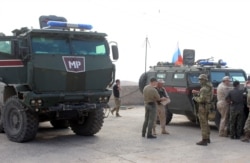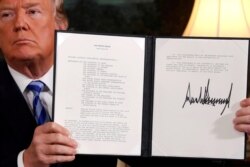Russia condemned U.S. airstrikes that killed a powerful Iranian commander in neighboring Iraq on Friday local time as a "reckless step" that risked "regional peace and stability" in the Middle East.
The United States killed General Qassem Soleimani, head of Iran's elite Revolutionary Guard Corps Quds Force, in a drone strike as he and an entourage left Baghdad's main airport by car.
Pentagon officials said U.S. President Donald Trump ordered the strike to prevent imminent attacks against American forces in the region.
Yet with Iran's leadership already vowing a military response, Russia openly questioned the White House's understanding of the violent forces it had unleashed.
"Such actions do not create ... find solutions to complex problems in the Middle East. On the contrary, it will lead to a new round of escalation of tensions in the region," said Russia's Foreign Ministry in a statement posted to its website.
In a separate statement, the ministry noted that Soleimani had "faithfully served and defended the national interests of Iran" and expressed condolences to the Iranian people over the commander's death.
The Kremlin's press service later announced that Russian President Vladimir Putin had discussed the attack with his French counterpart Emmanuel Macron by phone, with both sides agreeing "this action might seriously escalate tensions in the region."
The reaction reflected Russia and Iran's increasingly close relations — ties forged by a four-year military alliance in Syria, where both Moscow and Tehran have come to the aid of their mutual ally, Syrian leader Bashar al-Assad.
Several media reports say Soleimani — widely considered the military architect of Iran's actions in the Middle East — met with President Vladimir Putin and Russian Defense Minister Sergei Shoigu in Moscow in 2016 to personally discuss the Syrian offensive. Both the Iranian and Russian governments denied the meeting ever took place.
Soleimani is on a U.N. travel sanctions list and has been sanctioned by the U.S. since 2005 as a supporter of terrorism.
Observers in Moscow saw little chance of Russia coming to Iran's aide in the event of a wider military conflict.
"There's nothing Russia can do," says Alexey Malashenko, a longtime Middle East watcher and head of the Institute of Dialogue and Civilization said in an interview with VOA in Moscow.
"It's a situation involving Iran, the U.S., and Iraq."
Nuclear deals
Yet the U.S. strike on Soleimani again puts Iran near the top of a long list of issues causing friction between Moscow and Washington.
The Kremlin already had clashed with the Trump administration over its decision to rip up the Iran nuclear deal —- a denuclearization swap for sanctions relief agreement brokered with Iran by the U.S. Obama administration along with Britain, Russia, Germany, France, and China back in 2015.
Russia has found common ground with European powers in denouncing the Trump administration's decision to abandon the agreement in favor of what the White House touts as a "maximum pressure" campaign that will yield a better deal limiting Tehran's nuclear ambitions.
Indeed, Moscow had been working with France and Germany to find ways to maneuver around U.S. sanctions and thereby keep Iran in compliance — an effort foreign policy experts now concede is all but doomed because of the U.S. attack.
"The last hopes for resolving the problem of the Iran nuclear program have been bombed to shreds," wrote Konstantin Kosachev, the head of the Foreign Affairs Committee in Russia's upper chamber, the Federation Council, in a post to Facebook.
"Iran can now push forward its nuclear program, even if it wasn't planning to," added Kosachev.
"In that way, this is bigger than just the murder of one important figure."






